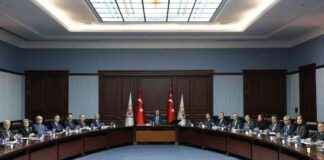Meta’s Controversial Censorship of Yahya Sinvar and Palestinian Shares
In the wake of the tragic assassination of Ismail Haniyeh in August, Yahya Sinvar was elected as the new Chief of the Political Bureau of Hamas. However, just days ago, Sinvar was martyred in an attack by the terrorist state of Israel in the southern Gaza Strip. Following Sinvar’s martyrdom, numerous political figures in our country expressed their condolences. Nevertheless, the Jewish-owned Meta company applied censorship to posts related to Sinvar’s condolences. Former Speaker of the Turkish Grand National Assembly, Mustafa Şentop, and the President of the Turkey Youth Foundation (TÜGVA), İbrahim Beşinci, had their messages of condolences regarding Yahya Sinvar removed from the Facebook and Instagram platforms owned by Meta.
Facebook justified the removal of the posts by stating, “It appears you shared, posted, praised, or followed symbols of individuals and organizations we define as dangerous. This is in violation of our Community Standards regarding dangerous individuals and organizations.”
Mustafa Şentop took to his X account to announce the censorship with a post saying, “Censorship from Meta on our message of condolences…” Meanwhile, İbrahim Beşinci commented on the censorship by stating, “Is this your understanding of press freedom and freedom of expression!”
The incident has sparked outrage and debate regarding the boundaries of freedom of speech and expression on social media platforms controlled by powerful corporations. Many are questioning the extent to which these platforms can dictate what can or cannot be shared, especially when it comes to sensitive political matters.
Meta’s Censorship Over Palestinian Shares
This is not the first time Meta has faced criticism for censoring content related to the Palestinian cause. The platform has been accused of silencing voices that speak out in support of Palestine and against Israeli aggression. The removal of posts related to Yahya Sinvar is just another example of Meta’s biased censorship policies that seem to prioritize certain political narratives over others.
The censorship of content related to Palestinian shares raises concerns about the power that social media companies hold in shaping public discourse and limiting the spread of information. It begs the question of whether these platforms are truly neutral arbiters of free speech or if they are influenced by their own political biases and interests.
The Impact of Meta’s Censorship
The censorship of posts related to Yahya Sinvar and Palestinian shares has not gone unnoticed by the public. Many are expressing their disappointment and frustration with Meta’s actions, arguing that it sets a dangerous precedent for the future of online discourse and freedom of expression.
By censoring content that is deemed “dangerous” or in violation of community standards, Meta is effectively silencing voices that may have important perspectives to share. This not only limits the diversity of opinions and viewpoints on the platform but also stifles the ability of individuals to engage in meaningful dialogue and debate on important issues.
The Need for Transparency and Accountability
In light of these recent events, there is a growing call for greater transparency and accountability from social media companies like Meta. Users are demanding to know how decisions regarding content moderation are made and who is ultimately responsible for determining what can and cannot be shared on these platforms.
It is crucial for these companies to uphold the principles of free speech and ensure that all voices are given a fair platform to express their views. Censorship of content related to sensitive political issues only serves to further polarize society and limit the exchange of ideas and information.
In conclusion, Meta’s censorship of posts related to Yahya Sinvar and Palestinian shares highlights the need for a more open and transparent approach to content moderation on social media platforms. It is essential that these companies prioritize freedom of expression and ensure that all voices are heard, regardless of their political affiliations or viewpoints. Only then can we truly have a democratic and inclusive online environment where diverse perspectives are respected and valued.





















